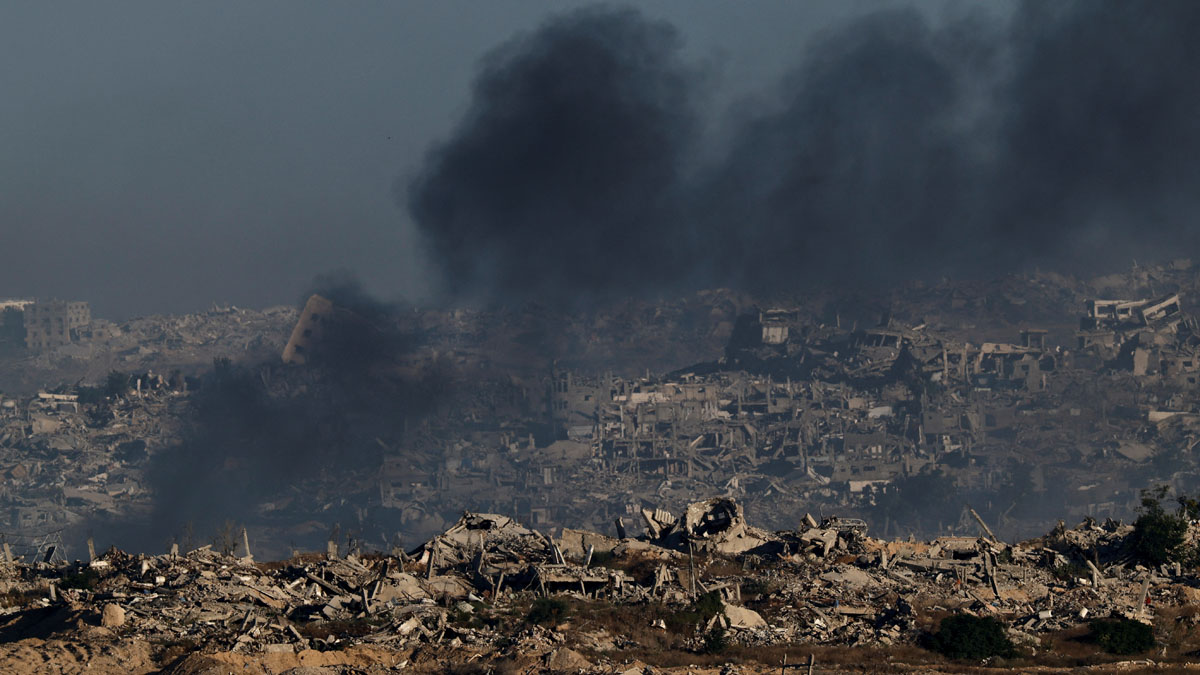Operation Black Flag: Israel strikes Houthis in Yemen after Red Sea ship attack
 Smoke rises in Gaza following an explosion, as seen from the Israeli side of the border, July 6, 2025. REUTERS/Amir Cohen
Smoke rises in Gaza following an explosion, as seen from the Israeli side of the border, July 6, 2025. REUTERS/Amir Cohen
Israel launched a wave of airstrikes early this morning targeting key ports and infrastructure controlled by Yemen’s Houthi rebels, hours after a cargo vessel was attacked in the Red Sea. The strikes marked a significant escalation in the ongoing conflict between Israel and Iranian-backed forces in the region.
The Israeli military said it struck Houthi positions at the ports of Hodeida, Ras Isa and Salif, as well as a power station at Ras Kanatib. The Galaxy Leader, a commercial ship seized by the Houthis in November 2023, was also hit. Israeli officials claimed Houthi forces had installed radar equipment on the vessel to track maritime traffic and support further attacks in the region.
“These ports are used by the Houthi terrorist regime to transfer weapons from the Iranian regime, which are employed to carry out terrorist operations against the state of Israel and its allies,” the Israel Defense Forces (IDF) said in a statement. The strikes were part of a new operation named “Black Flag,” announced by Defence Minister Israel Katz, who warned of further action. “What’s true for Iran is true for Yemen. Anyone who raises a hand against Israel will have it cut off,” he declared.
The Houthis acknowledged the airstrikes but gave no details on casualties or damage. Their military spokesman, Brigadier General Yahya Saree, claimed their air defences “effectively confronted” the Israeli assault using locally manufactured surface-to-air missiles, though he provided no evidence.
The attacks came in response to a major incident at sea on Sunday, when the Liberian-flagged bulk cargo vessel Magic Seas was ambushed while sailing northward in the Red Sea. According to maritime security firm Ambrey, the vessel was struck by small arms fire, rocket-propelled grenades and four bomb-laden drone boats. Two of the drones hit the port side of the ship, damaging its cargo, while the remaining two were destroyed by the vessel’s armed security team.
The Magic Seas caught fire and began taking on water, forcing the crew to abandon the ship. They were later rescued by a passing vessel. The attack took place about 100km southwest of the Houthi-controlled port of Hodeida. The UK Maritime Trade Operations centre confirmed the crew’s evacuation and reported that the ship had broadcast the presence of armed guards aboard.
Although initial reports stopped short of confirming Houthi involvement, the rebels later claimed responsibility, calling the strike a continuation of their support for Palestinians during the war between Israel and Hamas. Their official media, including the Al-Masirah satellite channel and Al Ansar Telegram account, said the vessel matched “the Yemeni criteria for targeting ships.”
In a statement, Yemen’s exiled information minister Moammar al-Eryani condemned the attack and blamed Iran for arming the Houthis with missiles, drones, sea mines and other military technology. “The attack also proves once again that the Houthis are merely a front for an Iranian scheme using Yemen as a platform to undermine regional and global stability,” he said.
The timing of the strike is particularly sensitive. Israeli Prime Minister Benjamin Netanyahu was travelling to Washington to meet with US President Donald Trump, while regional tensions remain high following a fragile ceasefire between Israel and Iran. The Houthis have resumed missile attacks on Israel after a brief lull, with one missile reportedly striking the Dead Sea region on Sunday. Sirens also sounded in the West Bank.
Since the Gaza war began in October 2023, Houthis have been targeting commercial shipping, claiming their attacks were in solidarity with Palestinians. Their campaign has included missiles, aerial drones and sea-borne explosive devices, severely disrupting maritime traffic through the Red Sea.
Between late 2023 and early 2025, over 100 merchant vessels have been attacked by the Houthis, with two ships sunk and four sailors killed. These assaults have forced shipping companies to reroute around the Cape of Good Hope, bypassing the Suez Canal and adding substantial cost and time to global trade. Industry estimates suggest the disruption has increased shipping expenses by nearly $200 billion.
Though the Houthis briefly paused attacks after a US-led air campaign in March 2025, the strike on the Magic Seas marks their first confirmed shipping attack since December. It is not yet clear whether US or European naval forces, including the multinational Operation Aspides security task force, will respond.
The Israeli military appears to be acting independently for now. While previous strikes on Yemen, such as the US assault in April that killed 74 people, were part of coordinated efforts, Israel is currently pursuing its own retaliatory strategy. In the wake of Monday’s events, the IDF issued evacuation warnings in Arabic for the targeted Yemeni ports and installations prior to the strikes. The Houthis, however, have continued to frame Israel’s actions as unjustified aggression against civilian infrastructure. Houthi political bureau member Mohammed al-Farah said the targeting of ports and power stations was “an attempt to harm civilians and has no connection to any military activity.”
As regional players weigh their next moves, the conflict risks widening beyond Gaza. “This is no longer about Gaza or shipping,” said one Western diplomat based in the Gulf. “It’s become a regional confrontation between Israel and Iran’s proxies, and everyone else is being forced to choose a side.”
Middle East